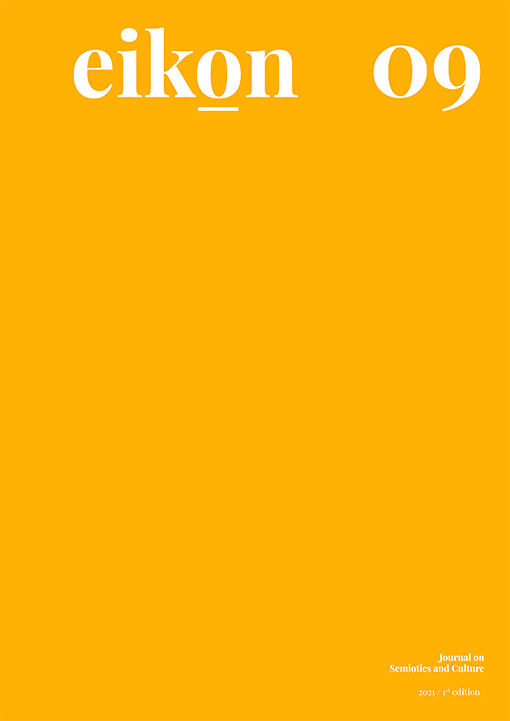Desire, (in)transitive verb: The conjugation of desire in the features Phantom and Stranger by the Lake
Keywords:
Desire, Phantom, Stranger by the Lake, João Pedro Rodrigues, Alain Guiraudie, queer cinemaAbstract
This paper investigates how filmmakers João Pedro Rodrigues and Alain Guiraudie articulate the dimension of desire in their features Phantom and Stranger by the Lake, respectively. In order to do so, the analysis puts the philosophical concepts gathered by Ollivier Pourriol in the book Vertiges du Désir: Comprendre le Désir par le Cinéma in dialog with other authors that allow the application of his theories in queer cinema. By doing so, it shows how the two directors place the act of desire at the center of their narratives, and by frustrating such desire, engage in a reflection on the viewer’s platonic relationship with narrative cinema.
References
Char, R. (2000). Furor e Mistério. Lisboa: Relógio D’Água
Foucault, M. (2009). Ditos e Escritos vol. III. Estética: Literatura e Pintura, Música e Cinema. São Paulo: Forense Universitária (4ª ed.)
Mulvey, L. (1975). “Prazer Visual e Cinema Narrativo”. In: Xavier, I. (org.) (2018). A Experiência do Cinema. São Paulo: Paz e Terra (pp. 376-394)
Pourriol, O. (2012). Filosofando no Cinema: 25 Filmes para Entender o Desejo [versão Kindle]. Rio de Janeiro: Jorge Zahar Editor. Disponível em: http://www.amazon.com/
Sarmet, E. & Baltar, M. (2016). “Pedagogias do desejo no cinema queer contemporâneo”. Texturas, 18 (38). (p. 50-66)
Silva, A. M. da (2014). “The Portuguese Queer Screen: Gender Possibilities in João Pedro Rodrigues’s Cinematic Production”. In: Rupkatha Journal on Interdisciplinary Studies in Humanities (ISSN 0975-2935), Vol. VI, No. 1, 2014. Disponível em: http://rupkatha.com/V6/n1/07_Joao_Pedro_Rodrigues.pdf. Acesso em 06.05.2020
Sedeño, A. (2016). “Imaginarios del Cuerpo y la Memoria del Cine Contemporáneo: Reflexiones sobre el Cine de Miguel Gomes y João Pedro Rodrigues”. In: Fotocinema. Revista científica de cine y fotografía, nº XX, pp. 267-280. Disponível em: http://www.revistafotocinema.com/. Acesso em 06.05.2020
Vieira Jr. E. (2018). “Sensorialidades Queer no Cinema Contemporâneo: Precariedade e Intimidade como Formas de Resistência”. In: Contemporanea | Comunicação e Cultura - v.16 – n.01 – jan-abr 2018 – p. 168-182 | ISSN: 18099386. Disponível em: http://www.contemporanea.poscom.ufba.br. Acesso em 06.05.2020
Walton, S. (2013). “Cruising the Unknown: Film as Rhythm and Embodied Apprehension in L’Inconnu du lac/Stranger by the Lake”. In: New Review of Film and Television Studies, 16:3, 238-263, DOI: 10.1080/17400309.2018.1479183. Disponível em: https://doi.org/10.1080/17400309.2018.1479183. Acesso em 06.05.2020
Winterton, C. (2018). “Blurred Lines: The Case of Stranger by the Lake”. In: Coleman, L. & Siegel, C. (2018). Intercourse in Television and Film. Washington: Lexington Books
Webgrafia
Dias, V. S. & Pereira, C. & Jácome, J. (2011). João Pedro Rodrigues: o fundamental é o festival onde o filme é apresentado. Disponível em: http://hdl.handle.net/10400.21/314. Acesso em 06.05.2020
Downloads
Published
Issue
Section
License
Authors who publish with this journal agree to the following terms:
- Authors retain copyright and grant the journal right of first publication with the work simultaneously licensed under a Creative Commons Attribution License that allows others to share the work with an acknowledgement of the work's authorship and initial publication in this journal.
- Authors are able to enter into separate, additional contractual arrangements for the non-exclusive distribution of the journal's published version of the work (e.g., post it to an institutional repository or publish it in a book), with an acknowledgement of its initial publication in this journal.
- Authors are permitted and encouraged to post their work online (e.g., in institutional repositories or on their website) prior to and during the submission process, as it can lead to productive exchanges, as well as earlier and greater citation of published work (See The Effect of Open Access).

